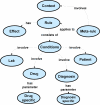Constructing Clinical Decision Support Systems for Adverse Drug Event Prevention: A Knowledge-based Approach
- PMID: 21347009
- PMCID: PMC3041377
Constructing Clinical Decision Support Systems for Adverse Drug Event Prevention: A Knowledge-based Approach
Abstract
A knowledge-based approach is proposed that is employed for the construction of a framework suitable for the management and effective use of knowledge on Adverse Drug Event (ADE) prevention. The framework has as its core part a Knowledge Base (KB) comprised of rule-based knowledge sources, that is accompanied by the necessary inference and query mechanisms to provide healthcare professionals and patients with decision support services in clinical practice, in terms of alerts and recommendations on preventable ADEs. The relevant Knowledge Based System (KBS) is developed in the context of the EU-funded research project PSIP (Patient Safety through Intelligent Procedures in Medication). In the current paper, we present the foundations of the framework, its knowledge model and KB structure, as well as recent progress as regards the population of the KB, the implementation of the KBS, and results on the KBS verification in decision support operation.
Figures
References
-
- Murff HJ, Patel VL, Hripcsak G, Bates DW. Detecting adverse events for patient safety research: a review of current methodologies. J Biomed Inform. 2003;36(1–2):131–43. - PubMed
-
- Estacio-Moreno A, Toussaint Y, Bousquet C. Mining for adverse drug events with formal concept analysis. Stud Health Technol Inform. 2008;136:803–8. - PubMed
-
- Bousquet C, Henegar C, Lillo-Le Louët A, Degoulet P, Jaulent M-C. Implementation of automated signal generation in pharmacovigilance using a knowledge-based approach. Int J Med Inform. 2005;74(7–8):563–71. - PubMed
MeSH terms
LinkOut - more resources
Full Text Sources
Other Literature Sources
Medical


